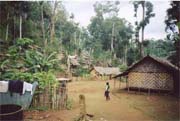|
Part I: Administration
There are many major administrative flaws within all refugee camps that have impacted the camp residents negatively. While the camp administrative bodies are elected to serve the interests of the residents4 they have in some cases become self-serving entities that greatly inhibit the development of a safe and secure environment for their residents. This is not to say that all camp administrative bodies are failing or are not carrying out their designated functions. Many administrative bodies do a good job contributing to stability of the camps and promoting the welfare of the refugee people. However, as the objective of this research is to study the flaws or failings of rule of law institutions within the camps, only those areas of concern will be highlighted. The failings of these administrative bodies can be summarized under the following issues;
I. A. Flaws within the electoral process -
While elections are held within all camps there are no guarantees that those officials elected by popular vote will be appointed to their posts. The reasons for this vary from nepotism and discrimination to personal grievances. For instance, during the 2002 camp elections in Karenni 1 a resident received the highest number of votes within his section. This enabled him to take up the position of section leader. However due to conflict with members of the camp administration committee he was appointed deputy section leader. The basis for this decision was that while the elected official could speak Karenni language fluently, he was married to a woman of Shan nationality and therefore should not serve as section leader. Similarly in Noe Phoe camp, an incident occurred whereby an elected chairperson was dismissed before he took his position and replaced with another due to pressure exerted upon the committee by a local ethnic armed organization who wished for another candidate to carry out the function of chairperson.
These types of incidents leave residents feeling aggrieved towards election officials and pessimistic about the impartiality and fairness of the election process. Without respect for elected officials and the process under which they were elected it is very difficult for a democratic system of governance to fully take hold within the camps. This places the security of residents at risk because in many cases the administration bodies are the institution that upholds justice and the rule of law within the camps.
I. B. Accountability of elected officials and administrative officials-
There are no internal camp mechanisms to hold elected officials accountable for their actions. If they breach their official duties or break the law, residents are powerless to impose penalties or have them punished. In one instance, in Mae Kong Kha camp, a committee member was allegedly involved in the murder of a camp resident. However due to his position within the camp no investigation was ever conducted or charges brought. Once again these types of abuses do little to install confidence amongst camp residents that the administrative bodies are there to serve their needs. Instead it leaves residents frustrated and upset over the lack of avenues open to them for justice within the camp system.
I.C. Lack of guidelines and administrative regulations -
Quite often elected officials are unsure of what their mandate includes or where their elected duties begin and end. Within the various camp administration bodies5 the authority of the section, zone and camp bodies is not clearly demarcated. As a consequence, residents are unsure as to where grievances should be taken, how they will be dealt with and who has the authority to issue punishments. Residents are forced in some cases to take matters into their own hands in order to seek compensation or justice. This promotes an environment of mistrust, suspicion and insecurity amongst camp residents and one that does not adhere to the principles of the rule of law.
I.D. Administrative corruption -
Due to a lack of mechanisms to hold officials accountable for their actions, corruption within the administrative has been known to occur. There have been serious accusations leveled at administration officials such as fraud. For example a committee member of Mae-la-Oo camp was found to have sold 400 bags rice for 100,000 baht. This rice was part of the camp rations. He kept 20,000 baht for himself and the remaining 80,000 baht were to be shared amongst the rest of the committee. Even though this was a serious breach of his duties and a criminal act, the committee only reprimanded him because he had taken an unequal proportion of the profits, not for the crime itself. These types of corrupt practices have a profound effect on the credibility of the administrative bodies and their officials. A lack of credibility leads to a lack of trust which means that decisions made by administration bodies will either be ignored or not accepted as decisions from a respected and corrupt free body.
I.E. Involvement of revolutionary groups -
The relationship that the camp committees have with the various revolutionary groups along with the Thai authorities severely impairs their impartiality and ability to administer justice. There are numerous examples where camp committees in conjunction with different revolutionary groups have been implicated in the murder of camp residents6. The status and influence these revolutionary groups have within the camps is profound. While their initial involvement in the early establishment of the camps contributed to the existence, functioning and administration, undue actions by many of their influential officials have undermined the regulatory and administrative authority that the camp bodies now have. Complicating this issue further is that some administrative bodies are proxy governments of these revolutionary groups. Within the Karenni camps the main camp committee is in fact not voted for by camp residents but rather appointed by the KNPP7. This compromises the ability and effectiveness of the main administration to act impartially and make decisions based on the interest of camp residents and not those of the KNPP. Despite the efforts of the external government to promote the rule of law, some of its officials have been implicated in serious crime within the camp, and with the internal governments powerless to exert any influence, residents are left in an unenviable position where their avenues to seek justice are already limited. With a reluctance to seek the help of Thai authorities8, the security of residents is severely compromised and the environment within the camp is again characterized by suspicion and mistrust.
All too often elected officials are more concerned about their own positions within the camp administrative structures than being responsive to the needs and wishes of the residents. Corruption, in some camp bodies, is part of the administration psyche and with no mechanisms to hold officials accountable for their actions it is difficult to see this changing in its current form. Adding to the complexity of this issue is the negative impact that involvement by the various revolutionary armies and government have within the administrative process. All of these factors seriously undermine the security situation within the camp. The social contract that the   camp residents and elected officials enter into when they are elected is compromised in almost everyway. Ensuring for the welfareand protection of its residents no longer becomes the primary concern of these administrative bodies, and with no strong administrative deterrents in place to stop would be criminals, residents find themselves even more vulnerable to crime and therefore insecure. camp residents and elected officials enter into when they are elected is compromised in almost everyway. Ensuring for the welfareand protection of its residents no longer becomes the primary concern of these administrative bodies, and with no strong administrative deterrents in place to stop would be criminals, residents find themselves even more vulnerable to crime and therefore insecure.
|


 camp residents and elected officials enter into when they are elected is compromised in almost everyway. Ensuring for the welfareand protection of its residents no longer becomes the primary concern of these administrative bodies, and with no strong administrative deterrents in place to stop would be criminals, residents find themselves even more vulnerable to crime and therefore insecure.
camp residents and elected officials enter into when they are elected is compromised in almost everyway. Ensuring for the welfareand protection of its residents no longer becomes the primary concern of these administrative bodies, and with no strong administrative deterrents in place to stop would be criminals, residents find themselves even more vulnerable to crime and therefore insecure.